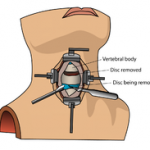If you suffer from back pain, you may think that surgery is the answer. But, how can you be sure? It is important that you consult with an orthopedic specialist. A certified spinal surgeon can diagnose the cause of the back pain and counsel a patient on the best therapies available, including surgery.
Do You Need Back Surgery?
Back and neck pain is often difficult to diagnose because it entails several different mechanisms. One of the most important indicators that a person may need back surgery is persistent pain that affects his/her ability to function. Back surgery is most helpful in relieving pain and numbness occurring in the arms or legs due to nerve compression in the spine.
Causes of Nerve Compression
There are several conditions that can cause nerves to compress. The most common ones include:
* Bulging or ruptured disks. A disk is soft cushiony tissue that separates the bones of the spine. Sometimes these can press too tightly against a spinal nerve and interfere with its functioning.
* Excessive bone growth. Bone spurs, or extra bone growth, can narrow the space for nerves to pass through openings in the spine.
* Fractures. Sometimes, spinal fractures cause pain because the bones become unstable. Fusion surgery can help to reduce pain by creating more stability to a fracture.
* Painful motion. The movement between two vertebrae can become very painful. This condition is normally the result of a degenerated or damaged disk.
Symptoms that Indicate Surgery May Be Necessary
* Severe low back pain
* Pain, numbness, or weakness in one or both legs
* Strange sensations in the legs, buttocks, inner thighs, or the backs of your legs or feet that are severe or continue to worsen over time
* Problems with bladder or bowel control
* Sudden sexual dysfunction
* Inability to function due to neck or back pain
Types of Back Surgery
There are several different surgical procedures used to remedy back and neck pain and degenerative conditions. Some are quite new, innovative, and minimally invasive, while other types of surgeries are more intricate and complex. Ask your surgeon about which techniques are most effective for treating your diagnosis. Make sure you understand both, the benefits and the risks.
Considerations
Different surgical techniques deliver different results. When you are faced with needing back or neck surgery, you need to consider the following:
* Is the surgery being done to relieve pain?
* Provide greater spinal motion?
* Stop deterioration?
* Remove a tumor?Sometimes, you will need to make a choice between different surgical procedures, because only one technique will work in your particular situation. The type of surgery you choose, if a choice is possible, depends largely on what result is most important to you. A fusion may be best if you are having surgery to eliminate pain. Still, a full disc replacement might be the better choice if you need to have more movement in your back. Discuss all options with your surgeon and make sure you understand all of the benefits, risks, outcomes, and consequences of each type of surgery.
Visit Suburban Orthopaedics for more information.


